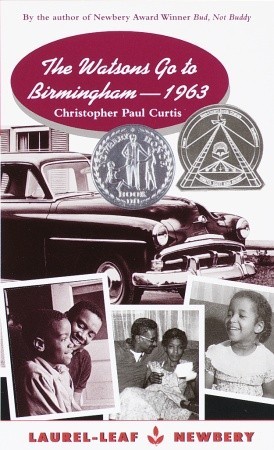- Newbery Honor Book
- Coretta Scott King Honor Book
- 224 pages
I had the strangest experience reading The Watsons Go to Birmingham- 1963. For the first fifty pages or so, I knew what was going to happen next. Exactly what would happen next. I knew, for example, that By would get his mouth stuck on ice in some way before he and Kenny even went outside. It wasn't that I remembered reading it before, it was more that I remembered experiencing the scene before. So while the text all felt new, the direction felt familiar.
My guess is that I began reading The Watsons Go to Birmingham- 1963 at some point in my childhood, and then never finished it for some reason. I say never finished it because the premonitions stopped after a while. But I think that it speaks to the power of author Christopher Paul Curtis' writing and of the characters he has created that even without finishing the book, such an impression was made that it lasted over nearly two decades.
The Watsons Go to Birmingham- 1963 is not a novel concerned with getting anywhere. Despite the trip indicated in the title, the first two-thirds of the book is spent focused on character development. The reader gets to know and to love narrator Kenny Watson, and to understand the complicated but loving dynamics of his family. By the time they finally set out on their trip, the reader is left wondering what exactly is going to make this trip worth the title of the book. Those with prior knowledge of the historical events covered in the book are wondering how Curtis will do them justice with over half of his book nearly over already. The answer, for me, lies in Curtis' audience.
The Watsons Go to Birmingham- 1963 is a work of fiction. The goal of good fiction is not to tell the reader the facts of an event, but rather to make the reader feel an event as acutely as if they were there. In Curtis' case, he had another goal as well: to make the reader identify directly with the people affected by the tragedy he recounts. It is for this reason that he has the reader spend so much time with the Watsons at the beginning of the novel.
The Watsons are an African-American family, which is not something that matters much in the first part of the novel. Though there are mentions of segregation, and of the Civil Rights movement sweeping the nation, the focus is really on the Watsons as a familiar, loving family unit. By having the reader follow Kenny through his conflicts with By, his moral dilemma with his friend Rufus, and his observations of his parents, Curtis allows the reader (and particularly the child reader) to identify with Kenny as a child. Not as a distinctly African-American child, but as a child just like we once were. We see in his family shades of our own, and this is the purpose of the first two-thirds of The Watsons Go to Birmingham-1963.
In Birmingham, the Watsons are witnesses to one of the most horrific events of the 1960s: the 16th Street Baptist Church bombing. This is an event that younger readers may or may not have yet encountered in their studies, but one with which older students and adults are likely very familiar. The facts are heartbreaking. But the emotional impact of the event is made that much more acute when it occurs to characters with whom we've spent nearly 180 pages identifying. The reader's reaction becomes necessarily much more personal.
Had Curtis focused his novel more on the details of the bombing, had he used his characters functionally more as eyes into the event, the reader would likely learn more of the facts of what occurred that day. But by making his characters instead souls with whom the reader empathizes, Curtis drives home the emotional impact of that day: that bomb killed little girls. Daughters. Sisters. Friends. People we've come to know and love were threatened, for a reason as arbitrary as the color of their skin. By the time you reach this point in the book, you can't help but feel your heart race for Kenny's sister Joey, even if you do know the historical facts. It is this that makes The Watsons Go to Birmingham- 1963 so powerful.
The Watsons Go to Birmingham- 1963 was made into a tv movie in 2013. There are suggestions in the trailer below that the film places more emphasis on the Civil Rights Movement and awareness of segregation. I can't comment on the appropriateness of this choice (if indeed that is the direction the film makers went), as film is an entirely different medium and I have not yet seen the full movie. However, I do think that in terms of his novel, Curtis made the right storytelling choice: to give children an experience of injustice, rather than another history lesson.

No comments:
Post a Comment